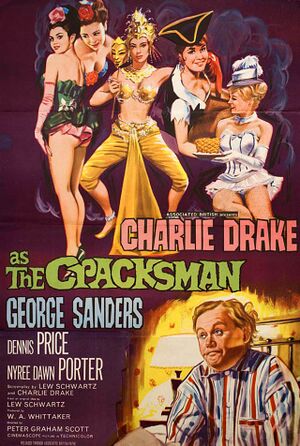The Cracksman
| The Cracksman | |
|---|---|
 | |
| Directed by | Peter Graham Scott |
| Produced by | W. A. Whittaker |
| Starring | Charlie Drake Nyree Dawn Porter George Sanders Dennis Price |
| Cinematography | Harry Waxman |
| Edited by | Richard Best |
| Music by | Ron Goodwin |
Production company | |
| Distributed by | Warner-Pathé Distributors |
Release date |
|
| Country | United Kingdom |
| Language | English |
The Cracksman is a 1963 British comedy film directed by Peter Graham Scott.[1][2][3]
Plot
Charlie Drake plays honest but naive locksmith Ernest Wright who believes that everybody else is equally honest. First, he is duped by a debonair con man into opening a car. He is caught by the police but given probation. Next, the same man fools him into breaking into a house, and again he is caught while the villain escapes and he lands in jail. When he is released, he again gets tricked, this time by a woman, into opening a safe, for which he receives a three-year jail sentence. On arrival in prison, he has a reputation as a master thief. Upon his release, he finds himself as a pawn being manipulated by two gangs into a safe-cracking scheme but, with the help of undercover policewoman Muriel, he helps trap the crooks and clear his name.
Portions of the film satirise the 1962 films Birdman of Alcatraz and Dr. No, Drake's hit song My Boomerang Won't Come Back, and the Ceremony of the Keys at the Tower of London.
Cast
- Charlie Drake as Ernest Wright
- Nyree Dawn Porter as Muriel
- George Sanders as Guv'nor
- Dennis Price as Grantley
- Percy Herbert as Nosher Jenkins
- Eddie Byrne as Domino
- Finlay Currie as Feathers
- Geoffrey Keen as Magistrate
- George A. Cooper as Fred
- Patrick Cargill as Museum Guide
- Norman Bird as Policeman
- Neil McCarthy as Van Gogh
- Christopher Rhodes as Mr. King
- Ronnie Barker as Yossle
- Wanda Ventham as Sandra
- Jerold Wells as Chief Prison Officer
- Tutte Lemkow as Choreographer
- Richard Leech as Detective Sergeant
- Robert Shaw as Moke
Additional credits
- Delia Derbyshire created the sound for the "In a Monastery Garden" sequence. The instrument is, in her words, "an E♭ safe-unlocking mechanism".
References
- ^ The New York Times
- ^ Variety
- ^ Personal letter from Delia Derbyshire to Associated British Picture Corporation, dated 25 April 1963.
External links
- Articles with short description
- Template film date with 1 release date
- IMDb title ID not in Wikidata
- 1963 films
- 1960s crime comedy films
- British crime comedy films
- Films shot at Associated British Studios
- Films scored by Ron Goodwin
- 1963 comedy films
- 1960s English-language films
- 1960s British films
- British comedy films